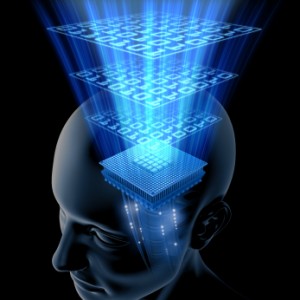

Introspection and imaginative extrospection are both requied to achieve high degrees of interoperability across boundaries of sophistocated, highly evolved and possibly ridgid systems of social interchange.

Similarly, faced with a more expansive sphere of potential interchange, abstraction of a more complex nature is required. That is to say, a broader plane of interoperability. The need to express or the potential utility derived from sharing and exchanging of such assigned meaning drives the process of abstraction yielding vocabulary of both physical utterance and action that demands organized AWARENESS within the individual's own mentation and that of other individuals in the relavent social environment. One acquires somatisensory input, such as it is and assigns highly personalized, idiosyncratic and subjective meaning to the input. Developmentally, for example, an otherwise physically nourished individual possess and makes individually beneficial use of what is sensed in the absence of a formal vocabulary and extensive societal protocal for information interchange. SENTIENCE seems to carry and connote characteristics which satisfy conditions of minimal interoperability between the individual and a necessary set of others. Hope I could help, check the links for more information.ĭrawing on existing contributions, I wonder if introducing the concept of interoperability might lend clarity and a useful organizing stability to the discussion of these interrelated terms? To wit:Ĭonsider human development (both of an individual subject and of the specie in toto) and the utility of the underlying characteristics embodied by each of these three terms. Consciousness then is used in many different meanings, but often as a umbrella term for several faculties. Awareness is mainly the physical act of perceiving, while sentience is a subjective way of actually being affected. If I'm not mistaken it's halfway safe to say that awareness and sentience are levels or subclasses of the consciousness. In biological psychology, awareness is defined as a human's or an animal's perception and cognitive reaction to a condition or event. More broadly, it is the state or quality of being aware of something. In this level of consciousness, sense data can be confirmed by an observer without necessarily implying understanding. (Wikipedia)Īwareness is the state or ability to perceive, to feel, or to be conscious of events, objects, or sensory patterns.
#Sentience vs consciousness plus#
Sentience is a minimalistic way of defining "consciousness", which is otherwise commonly used to collectively describe sentience plus other characteristics of the mind. In modern western philosophy, sentience is the ability to have sensations or experiences (described by some thinkers as " qualia").

Eighteenth century philosophers used the concept to distinguish the ability to think ("reason") from the ability to feel ("sentience"). Sentience is the ability to feel, perceive, or be conscious, or to have subjective experiences. You should check the SEP article for there is a lot more to say about consciousness than one of us could actually summarise here. Others, though, have argued that the level of disagreement about the meaning of the word indicates that it either means different things to different people, or else is an umbrella term encompassing a variety of distinct meanings with no simple element in common (Wikipedia). I will try to find some exemplary definitions:Ĭonsciousness: Many philosophers have argued that consciousness is a unitary concept that is understood intuitively by the majority of people in spite of the difficulty in defining it. That is, if you're conscious, it seems to imply that you can also be conscious of being conscious.These are all terms that one frequently reads in texts on Cognitive Science. The emphasis here, however, is on the private and subjective parts, not the phenomenal part, which is debatable and filled with semantic traps.Įdit: I almost forgot to add that one major deficiency in my definition of consciousness is that some might see consciousness as inherently meta-epistemic. I have personally settled on a definition that's somewhat analogous to sentience: any being with a private, subjective, first-person phenomenal self. "Conscious" is pretty debatable (one of the difficulties of studying it is that it means different things to different people). I would argue that anything that computes is sapient, but many people only allow sapiens that is capable of freeform creative thought (ie: Miley Cyrus yes, Deep Blue no). A human knows what it is like to taste something sweet, and a bat knows what it is like to see in sonar vision (if you were to argue that bats are sentient). Therefore, sentience implies that a creature has phenomenal qualia (pain, pleasure, redness). The root of the word sentience is the Latin 'sent' which means "to feel".


 0 kommentar(er)
0 kommentar(er)
